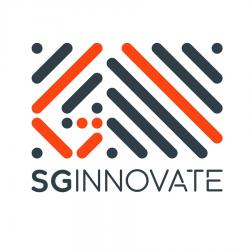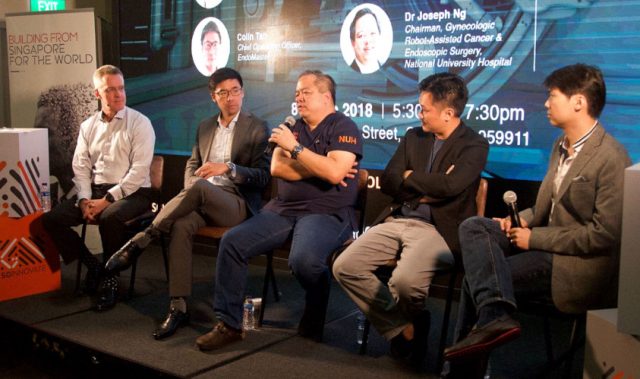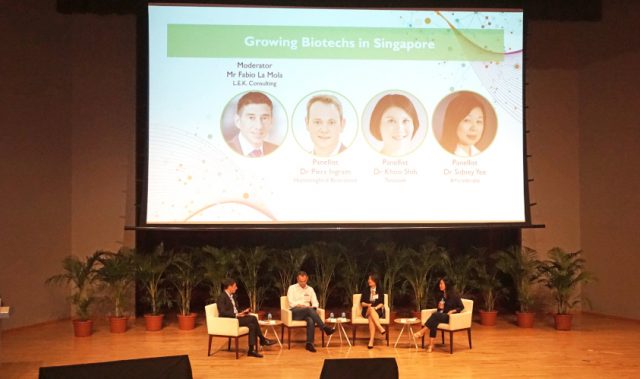
AsianScientist (Jan. 9, 2020) – By Juliana Chan – By using high frequency sound waves to visualise internal body structures, ultrasound imaging serves as a safe and affordable diagnostic tool for a wide range of applications that include monitoring a growing foetus, guiding a biopsy and detecting blockages in blood flow.
Yet nearly two-thirds of the world’s population lacks access to this basic medical imaging service, according to the World Health Organisation. This is despite the fact that modern ultrasound probes are cheap, widely available and small enough to fit in a pocket, says Dr Dornoosh Zonoobi, co-founder of HealthTech startup Medo.ai, which aims to transform ultrasound into the stethoscope of the 21st century.
“Without extensive training, ultrasound images are noisy like a snowstorm, and depending on where the probe is pointed, akin to using a flashlight in a dark room. The engineer in me had a nagging feeling that we could do something about this,” Dr Zonoobi says.
To eliminate the need for a radiologist to be physically present during an ultrasound scan, Medo.ai simplifies diagnosis from ultrasound imaging by combining artificial intelligence (AI), 3D technologies and cloud computing.
Mind the Diagnostic Gap
After completing a PhD degree in medical machine learning at the National University of Singapore, Dr Zonoobi accumulated over a decade of research experience in the field before what she calls a “pivotal moment” in her career.
“While working in a hospital’s radiology department, I witnessed patients flying thousands of kilometres just to get a simple scan done,” says Dr Zonoobi. “I realised that access to medical imaging, which is one of the most important tools for reaching a diagnosis, is limited and centralised.”
Together with her radiologist co-founders, Dr Jeevesh Kapur and Dr Jacob Jaremko, the trio founded Medo.ai, which aims to create a device-independent platform that enables a wider range of frontline healthcare workers to perform ultrasound examinations.
“We offer a web-based architecture that interacts with the images and allows clinicians to directly view and analyse images, including those acquired from remote healthcare centres where medical expertise is limited,” she shares.
By taking 2D images from different angles, Medo’s AI technology generates 3D models of body parts, which are then compared to thousands of similar cases to reach a disease diagnosis. Its AI-augmented 3D ultrasound technology “radically simplifies the use of ultrasound imaging for common and critical conditions,” Dr Zonoobi says.
Clinical Success on the Horizon
Medo.ai’s first and most advanced module is built around detecting hip dysplasia, a hip joint abnormality that progressively causes the disintegration of joint cartilage if not caught early. To date, Medo.ai has conducted four multi-centre clinical studies confirming the accuracy of its 3D surface models for hip dysplasia, says Dr Zonoobi.
“Our studies on more than 5,300 hip scans collected over five years from four different countries demonstrated that our technology detects developmental dysplasia of the hip more accurately than from 2D scans, with 75 percent fewer inconclusive cases,” says Dr Zonoobi.
“In our latest study, we confirmed that our solution is reliable even in the hands of novice users,” she adds.
Currently in progress are two newer clinical studies that are part of Medo.ai’s product verification and validation phase, says Dr Zonoobi. Once completed, the study results will be aggregated and submitted to the US Food and Drug Administration (FDA) for clearance in later this year.
Upon FDA clearance, the majority of the company’s revenue is predicted to come from fee-per-study software licenses, either as perpetual (one-time) software licences or software-as-a-service (SaaS) licenses, she says.
Besides its hip dysplasia diagnostic solution, Medo.ai is also developing other use cases, such as the detection and characterisation of thyroid nodules, as well as the early detection of masses and inflammation in the liver, says Dr Zonoobi. Data collection, labelling and validation have been concluded for these use cases, and the company aims to apply for the second round of FDA clearance before the end of 2019.
The Advent of AI in Healthcare
For Medo.ai to build up its AI capacity, it needs to gain access to large and diverse sets of healthcare data, a logistical challenge that also poses legal and ethical considerations, she says.
“As of today, legal ownership of the data and the transfer [process] of healthcare records to private entities are not particularly clear.”
Another challenge Medo.ai faces is in managing public opinion—as well as those of clinicians—on the use of AI in healthcare.
“It is undeniable that AI, just like human intelligence, is not immune to mistakes, and as of now, there is still not enough clarity on where the accountability lies,” notes Dr Zonoobi, adding that inevitable changes in workflows and job roles brought about by AI remain a cause for public concern.
As Medo.ai pushes on towards its end goal of commercialising AI-backed ultrasound technology, Dr Zonoobi acknowledges the role that SGInnovate has played as one of Medo.ai’s earliest investors, and also by providing Medo.ai with critical industry expertise in the region.
“SGInnovate has, time and again, provided us with platforms to showcase our technology to potential stakeholders and customers in the region; they have been extremely active in helping us build connections and collaborations,” says Dr Zonoobi.
SGInnovate believes that Deep Tech has the potential to solve today’s healthcare problems. As such, SGInnovate takes a vested interest in working with entrepreneurial scientists to build and scale their companies.
Medo.ai is one of SGInnovate’s portfolio companies.
Asian Scientist Magazine is a content partner of the SGInnovate.
———
Copyright: SGInnovate. Read the original article here.
Disclaimer: This article does not necessarily reflect the views of AsianScientist or its staff.












